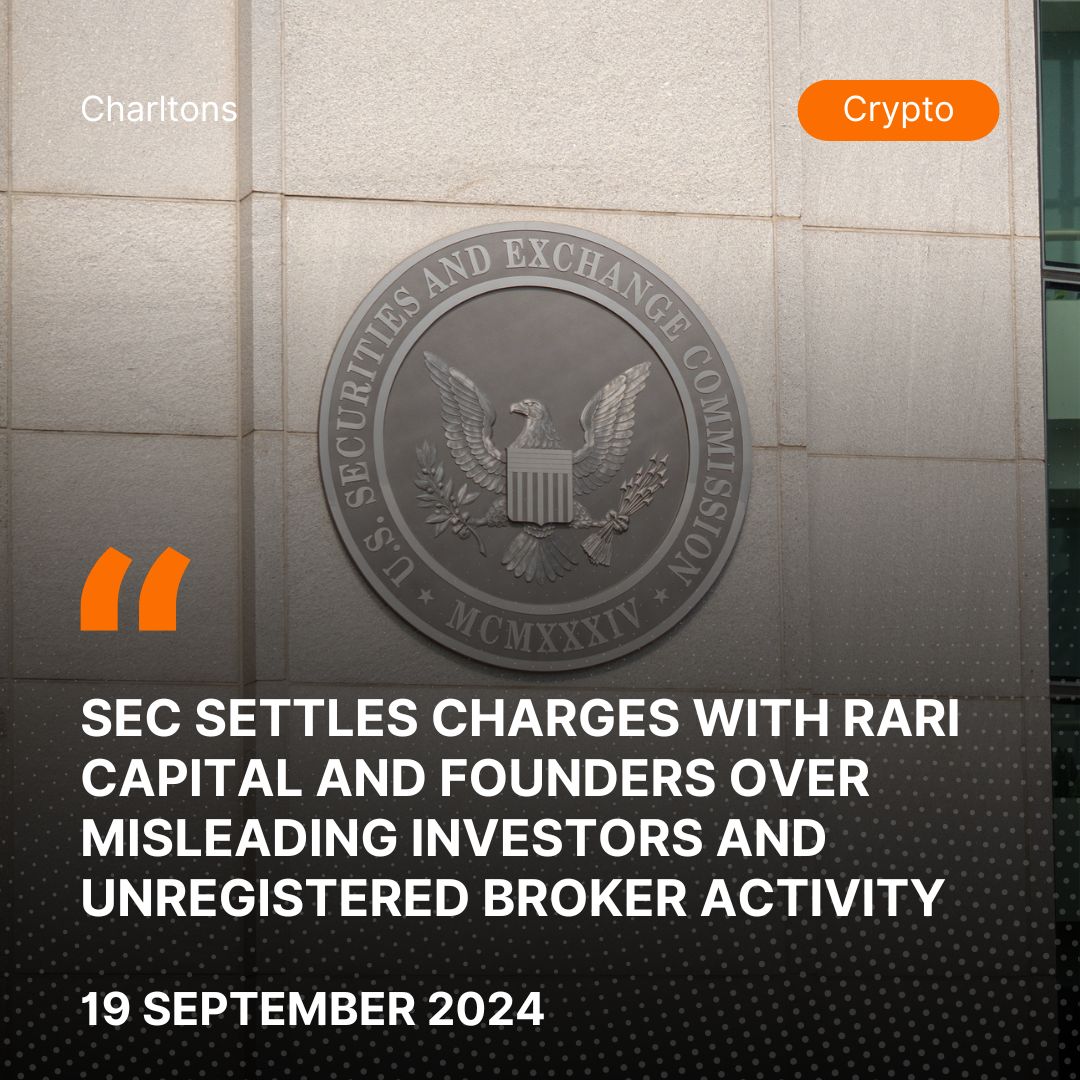
On 18 September 2024, the United States’ Securities and Exchange Commission (US SEC) announced that Rari Capital Inc., along with its co-founders Jai Bhavnani, Jack Lipstone, and David Lucid, agreed to settle charges of misleading investors and acting as unregistered brokers. The case stems from Rari Capital’s operation of two blockchain-based investment platforms, the Earn and Fuse pools, which collectively held over US $1 billion in crypto assets at their peak. Additionally, the US SEC charged Rari Capital for conducting unregistered offerings of securities tied to these platforms. In a separate order, Rari Capital Infrastructure LLC, which took over operations of the Fuse platform in 2022, also settled charges related to unregistered securities offerings and broker activity.
According to the US SEC’s complaint, Rari Capital’s Earn and Fuse pools functioned similarly to traditional investment funds, allowing investors to deposit crypto assets and receive tokens representing their interests in these pools. Investors were promised returns generated by the crypto lending activities of the pools. The complaint highlights that Rari Capital misrepresented the operation of the Earn pools, stating that they would automatically and autonomously rebalance crypto assets into high-yield opportunities. However, the rebalancing process often required manual intervention, which Rari Capital sometimes failed to initiate, misleading investors about the true nature of their investments. Furthermore, Rari Capital and its co-founders allegedly exaggerated the high annual percentage yields (APYs) investors would earn, failing to properly disclose fees and other costs. This resulted in many investors losing money on their investments, contrary to the company’s promotional claims.
The US SEC’s investigation revealed that Rari Capital operated the Fuse platform, which allowed users to create and manage their own lending pools. However, Rari Capital retained control over the platform’s smart contracts and charged a performance fee on interest generated by the pools. The US SEC concluded that these actions amounted to unregistered broker activity, as Rari Capital and its co-founders engaged in selling securities without proper registration or exemption under federal securities laws.
In a separate development, Rari Capital Infrastructure LLC, which took over Fuse’s operations in March 2022, continued the unlawful offering of securities and unregistered broker activity. The Fuse platform faced challenges when, in May 2022, a hacking incident resulted in the loss of approximately $80 million. This event caused Rari Capital to halt new deposits and eventually wind down its operations.
The settlement, announced by the US SEC, involves penalties and restrictions for Rari Capital and its founders. Without admitting or denying the allegations, Rari Capital and the co-founders agreed to settle the charges by consenting to the entry of permanent injunctions. These injunctions prevent them from future violations of federal securities laws and bar them from participating in unregistered offerings of securities. Additionally, conduct-based injunctions were imposed, preventing further engagement in unlawful broker activity. The co-founders also agreed to officer-and-director bars for a period of five years, prohibiting them from serving in those roles for public companies.
The co-founders are required to pay civil penalties and disgorgement of ill-gotten gains, along with prejudgment interest. These penalties are aimed at compensating the investors who suffered losses due to Rari Capital’s misleading practices. Rari Capital Infrastructure LLC also agreed to a cease-and-desist order, further solidifying the US SEC’s stance against unregistered securities activities within the decentralized finance (DeFi) sector.
As noted by Monique C. Winkler, Director of the SEC’s San Francisco Regional Office, the US SEC will continue to look beyond the labels of “decentralized” or “autonomous” to assess the economic realities of such platforms. In her statement, Winkler emphasized that the US SEC will hold accountable individuals and entities that harm investors and violate federal securities laws, regardless of how these products are labeled or marketed.
The investigation, led by the US SEC’s Crypto Assets and Cyber Unit, involved a thorough examination of Rari Capital’s practices, which revealed violations of securities laws. The settlement reached with Rari Capital and its co-founders, as well as Rari Capital Infrastructure LLC, is subject to court approval and marks another critical step in the US SEC’s broader efforts to regulate the DeFi space and ensure that investors receive the protections they are entitled to under the law.
(Source: https://www.sec.gov/newsroom/press-releases/2024-138, https://www.sec.gov/files/litigation/complaints/2024/comp-pr2024-138.pdf, https://www.sec.gov/files/litigation/admin/2024/33-11306.pdf)





